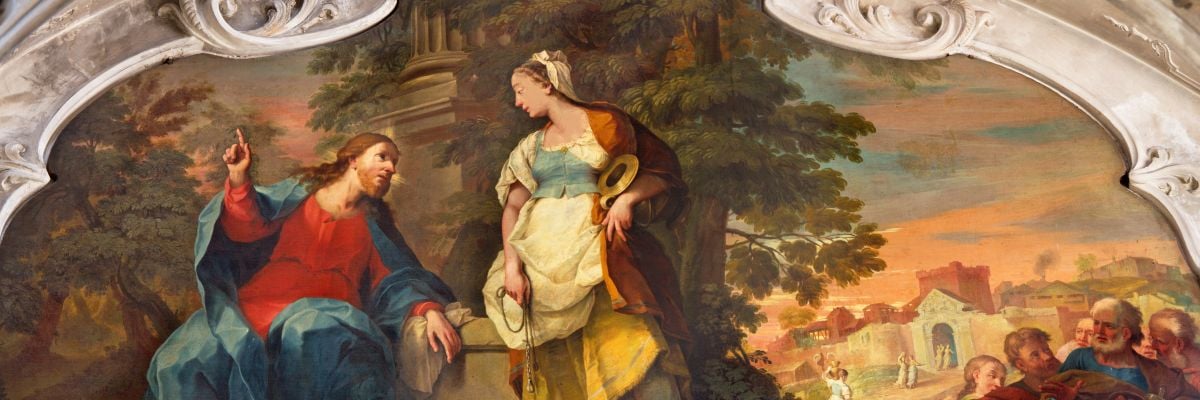
Homily for the Third Sunday of Lent, Year A
A woman of Samaria came to draw water.
Jesus said to her,
“Give me a drink.”
His disciples had gone into the town to buy food.
The Samaritan woman said to him,
“How can you, a Jew, ask me, a Samaritan woman, for a drink?”
—for Jews use nothing in common with Samaritans.
Jesus answered and said to her,
“If you knew the gift of God
and who is saying to you, ‘Give me a drink, ‘
you would have asked him
and he would have given you living water.”
The woman said to him,
“Sir, you do not even have a bucket and the cistern is deep;
where then can you get this living water?
Are you greater than our father Jacob,
who gave us this cistern and drank from it himself
with his children and his flocks?”
Jesus answered and said to her,
“Everyone who drinks this water will be thirsty again;
but whoever drinks the water I shall give will never thirst;
the water I shall give will become in him
a spring of water welling up to eternal life.”
The woman said to him,
“Sir, give me this water, so that I may not be thirsty
or have to keep coming here to draw water.”— John 4:7-15
“The cistern is deep.” I can attest that this is true. I once visited Jacob’s Well, now surrounded by the Palestinian city of Nablus. There is a large Orthodox church built over the well, named for the martyr St. Photina, which is the name of the Samaritan woman, who became a Christian along with her sons of her various husbands. (Her commemoration in the Tridentine Roman martyrology is March 20 and in the Byzantine rite February 28.) The monk who was our guide had me pour a cup of water into the well, and it took several seconds of silence before we heard the distant splash! We then cranked up the bucket and all had a drink from the well that had quenched the Savior’s bodily thirst.
His thirst! St. Teresa of Calcutta directed that “I thirst,” among the last words of Our Lord on the cross, be written on the wall of her congregation’s chapels next to the crucifix behind the altar. This devout insight teaches us that Our Lord’s thirst has a particular character different from ordinary human thirst for material water. Of course, he had that kind of thirst. The Gospel says he was hot and tired after his long walk and so asked for a drink to be given him. But his deepest thirst was not for something he needed to receive but for something he needed to give.
Our own thirst, then, means simply that God wants to give us water to drink. He gave us this desire so that he could pour out a good gift on us. Our need for water is his need to give it. For God, the love that gives and the love that receives is the same. In us, there are two distinct kinds of love: “need love,” which we have from infancy, and “gift love,” which we gain when we learn to love our neighbor and to love as Christ has loved us. When on the spiritual level Christ cries out, “I thirst!” from the cross, or says at the well, “Give me to drink,” he means he is moving us to receive his refreshing love.
It is our willingness to receive that he thirsts for; we give him our reception of his gifts as our gift! His own bodily thirst is a kind of sacrament or effective sign of his divine thirst to fill us with loving faith in him who can satisfy our desire utterly.
This is why he says so longingly, “If you but knew the gift of God and who it is who asks you, you would have asked him and he would have given you living water!” If only you and I could be deeply convinced of this fact: that God loves us first all the time, that any apparent initiative of ours, any cooperating with grace, is his gift. “My merit is his mercy,” St. Augustine says.
That God loves us with what theologians call a love of predilection (from the Latin prae-diligere, literally “to love before”) is a great encouragement to us sinners to keep on struggling. Imagine, he goes at midday to the well because he knows he will meet the Samaritan there at that hour, since her shame makes her go at a time when no one else will be there, and he asks her for a drink when by all custom he should not. And then he reveals to her that he is the Messiah before this fact is revealed publicly to all. He privileges this wretched one and shows her all his affection.
This is a sign to each of us. It is not in St. John’s Gospel only as a story about this one woman; it is a story about each one of us. As our Lent continues, let us continue to repent all the more confidently and joyfully as we slake the Lord’s thirst for our believing love and ours is quenched by his loving mercy.
St. Photina, pray for us!



